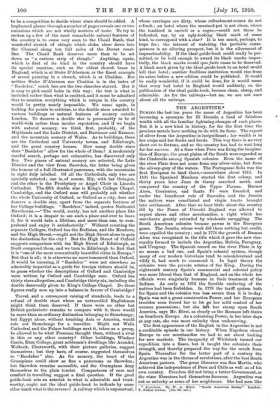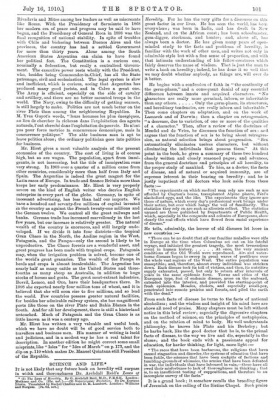THE ARGENTINE.* DURING the last ten years the name of
Argentina has been becoming a synonym for El Dorado, a land of fabulous wealth with all the familiar lightning.changes of such places. But it is a new kind in history, for for the first time the precious metals have nothing to do with its fame. The export of silver from the Argentine is insignificant ; her wealth is in her crops and her flocks and herds. This way there is no very short cut to fortune, and so the country has had to wait long for her success. At a time when Peru was firing the imagina- tion of Europe, the great plains of the South were regarded as the Cinderella among Spanish colonies. Even the name of the river Plate does not come from any silver-mine, but from the silvery-grey of the waters. The Portuguese Solis was the first European to land there,—somewhere about 1515. In 1535 the Spaniard Mendoza started the first colony, and thirty years later Juan de Garay marched north, and conquered the country of the Upper Parana. Buenos Aires, Corrientes, and Santa Fe were founded, and under the beneficent rule of Saavedra and the Jesuits the natives were conciliated and virgin tracts brought into settlement. After that we hear little about the country till by the Peace of Utrecht England was allowed to export slaves and other merchandise, a right which her merchants greatly extended by wholesale smuggling. The South American colonies became pawns in the European game. The Jesuits, whose work did them nothing but credit, were expelled the country ; and in 1776 the growth of Buenos Aires was recognised in the title which it gave the new vice- royalty formed to include the Argentine, Bolivia, Paraguay, and Uruguay. The Spanish record on the river Plate is by no means a bad one, and Spain's colonial system, though many of our modern historians tend to misunderstand and vilify it, had much to commend it. In legal theory the colonies were the private estates of the King. During the eighteenth century Spain's commercial and colonial policy was more liberal than that of England, and on the whole her officials were singularly humane in their treatment of the Indians. As early as 1612 the forcible enslaving of the natives had been forbidden. In 1778 the tariff system both for Spain and the colonies was less severe than it is to-day. Spain was not a great constructive Power, and her European troubles soon forced her to let go her mild control of her oversea possessions ; but she left her stamp upon South America, says Mr. Hirst, as clearly as the Romans left theirs on Southern Europe. As a colonising Power, in her later days at any rate, she was more unlucky than undeserving.
The first appearance of the English in the Argentine is not a creditable episode in our history. When Napoleon closed Europe to our merchandise we had to set about looking for new markets. The incapacity of Whitelock turned our expedition into a fiasco, but it taught the colonists their strength, and thereby prepared the way for the revolt from Spain. Thereafter for the better part of a century the Argentine was in the throes of revolutions, after the best South American pattern. The great liberator was San Martin, who achieved the independence of Peru and Chile as well as of his own country. Freedom did not bring a better Government, as the wiser liberators had themselves foreseen. Argentina was not so unlucky as some of her neighbours. She had men like
• Argentina. By W. A. Hirst. "South American Series." London : T. Fisher Unwin. [10s. 6d. net.l Rivadavia and Mitre among her leaders as well as miscreants like Rosas. With the Presidency of Sarmiento in 1868 her modern era of peace and progress may be said to have begun, and the Presidency of General Roca in 1898 was the final recognition of national stability. In spite of troubles with Chile and bickering between Buenos Aires and the provinces, the country has had a settled Government for more than thirty years. Alone among the South American States Argentina can claim to have found her political feet. The Constitution is a curious one, nominally a federation, but really a centralised Govern- ment. The executive power rests wholly with the President, who, besides being Commander-in-Chief, has all the State patronage, civil and ecclesiastical. The legal system is slow and inefficient, which is curious, seeing that Argentina has produced many good jurists, and in Calvo a great one. The Army is efficient, especially on the side of cavalry and artillery, and there are no better mounted troops in the world. The Navy, owing to the difficulty of getting seamen, is still largely to make. Politics are not much better on the river Plate than among the neighbouring Republics. In M. Yves Guyot's words, " leurs hommes les plus energiques, au lieu de chercher la richesse dans rexploitation des agents naturels, l'ont cherche dans rexploitation dnpouvoir. Its n'ont pm pour force motrice la concurrence economique, mais In concurrence politique." The able business man is apt to leave politics alone; the ordinary politician goes into politics for business.
Mr. Hirst gives a most valuable analysis of the present economics of the country. The cost of living is of course high, but so are wages. The population, apart from immi- grants, is not increasing, but the tide of immigration runs very strong. In 1908 over a quarter of a million came from other countries, considerably more than half from Italy and Spain. The Argentine is indeed the great magnet for the Latin races of Europe. In trade and finance Britain more than keeps her early predominance. Mr. Hirst is very properly severe on the kind of English writer who decries English enterprise in every part of the globe. Germany, in spite of incessant advertising, has less than half our imports. We have a hundred and seventy-five millions of capital invested in the country as against the French twenty-one millions and the German twelve. We control all the great railways and banks. German trade has increased marvellously in the last few years, but our increase is relatively greater. The natural wealth of the country is enormous, and still largely unde- veloped. If we divide it into four districts—the tropical Gran Chaco in the North, the Andine region in the West, Patagonia, and the Pampa—only the second is likely to be unproductive. The Chaco forests are a wonderful asset, and great progress has been made with tropical crops. Patagonia may, when the irrigation problem is solved, become one of the world's great granaries. The wealth of the Pampa in herds and crops is almost incalculable. The Argentine has nearly half as many cattle as the United States and three- fourths as many sheep as Australia, in addition to huge stocks of horses and goats. The great meat-extract industries, Bovril, Lemco, and Oxo, have their headquarters there. In 1908 she exported nearly four million tons of wheat, and it is believed that she will soon rise to five millions, and so lead the world. Few countries possess greater natural facilities, for besides her admirable railway system, she has magnificent ports like those on the river Plate and Bahia, Blanca in the South. And for all her development, there is still a hinterland untouched. Much of Patagonia and the Gran Chaco is as little known as it was a century ago.
Mr. Hirst has written a very valuable and useful book, which we have no doubt will be of good service both to travellers and business men. His manner of writing is lucid and judicious, and in a modest way he has a real talent for description. In another edition he might correct some small misprints, like " Isles " for " Ides of March " on p. 173, and the slip on p. 110 which makes Dr. Manuel Quintana still President of the Republic.







































 Previous page
Previous page